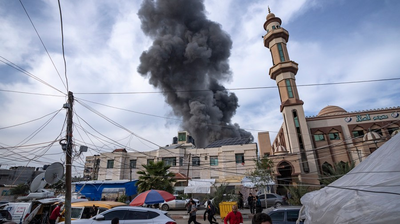
Nine out of 10 Palestinians in Gaza are eating less than one meal a day amid diminishing supplies of food and clean water, according to the World Food Program's (WFP) new statement on the humanitarian crisis in the war-torn territory.
Israel's bombardment of Gaza — both on the ground and by air — is posing "major challenges" for both humanitarian crews trying to deliver aid and for civilians searching for food in Gaza City, the World Food Progam said Wednesday.
“People in Gaza City do not even have the freedom to search for food. Anyone who moves would be risking their lives,” said journalist Hind Khoudary. "Neighbors have opened their doors to share whatever they have between them."
According to a new food analysis for Gaza, released by the WFP on Thursday, the agency found more than 1 in 4 households in Gaza "face extreme hunger," with humanitarian officials warning of famine unless the conflict ends and access to adequate food, clean water, health and sanitation services are restored.
The WFP said its staff members were told civilians are often going entire days without eating, and many adults go hungry to allow their children to eat.
About 26 percent of Gaza civilians — about 576,600 of the total 2.2 million person population — has exhausted food supplies as more aid convoys struggle to enter the region.
The WFP on Wednesday said there is a "serious bottleneck" at the Rafah border crossing and that even once the supplies are able to come into the region, several front-line areas in Gaza are inaccessible for aid workers.
“WFP has warned of this coming catastrophe for weeks. Tragically, without the safe, consistent access we have been calling for, the situation is desperate, and no one in Gaza is safe from starvation," said WFP’s Executive Director Cindy McCain.
Meanwhile, the shortages of food and clean, drinkable water are also leading to increased sicknesses among civilians, whose immunity systems have been compromised under such limited diets, the WFP said.
Medicine and medical equipment also continues to run low in the besieged territory, pushing hospitals and facilities to the brink of collapse. The World Health Organization's director-general said Wednesday there are no longer any functioning hospitals in northern Gaza after the area's "last functioning hospital" asserted earlier this week it is no longer able to perform surgery for the injured.
Israel’s war with Hamas, which has controlled Gaza since 2007, has raged on for more than two months since the militant group’s Oct. 7 attack on southern Israel, which left about 1,200 people dead.
Nearly 20,000 people have died in Gaza since the onset of the conflict, according to the Gaza Health Ministry, per The Associated Press.